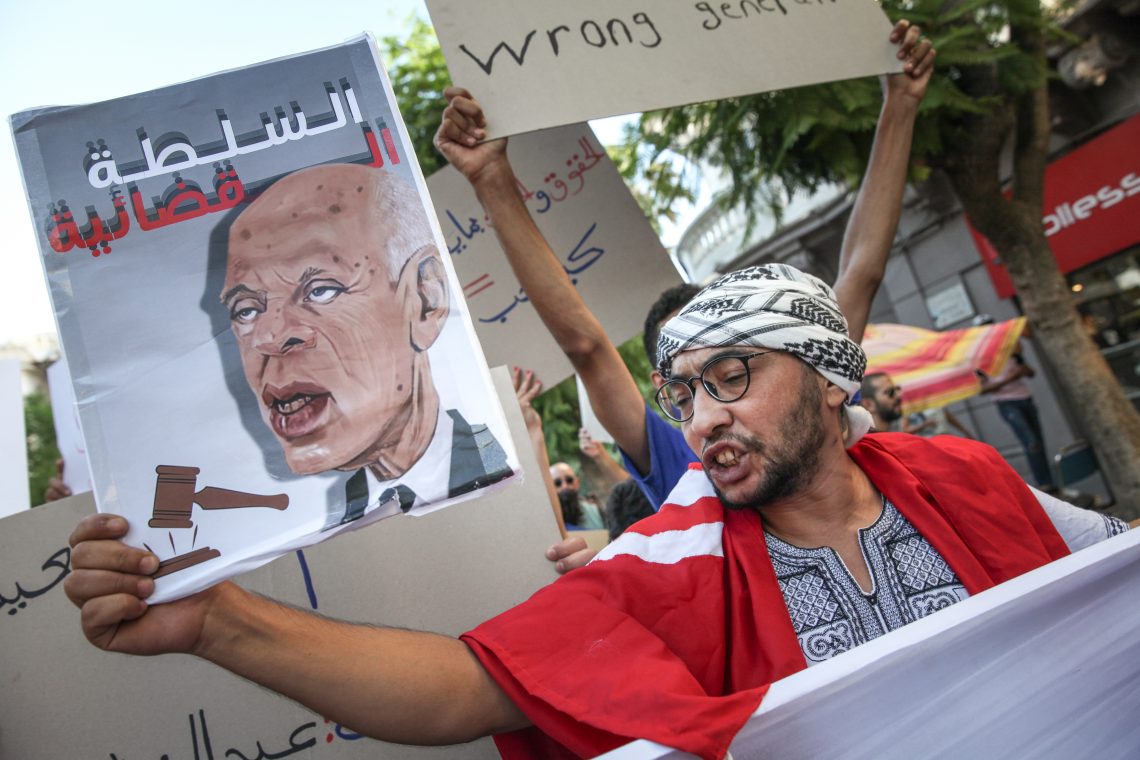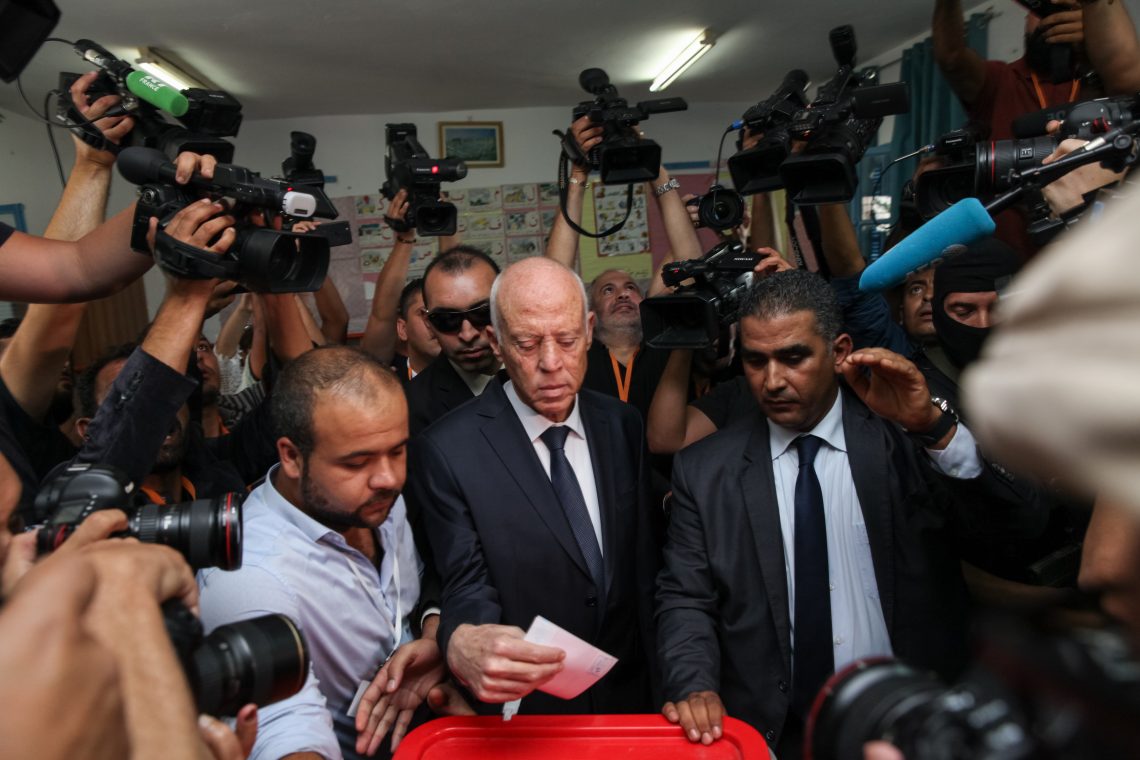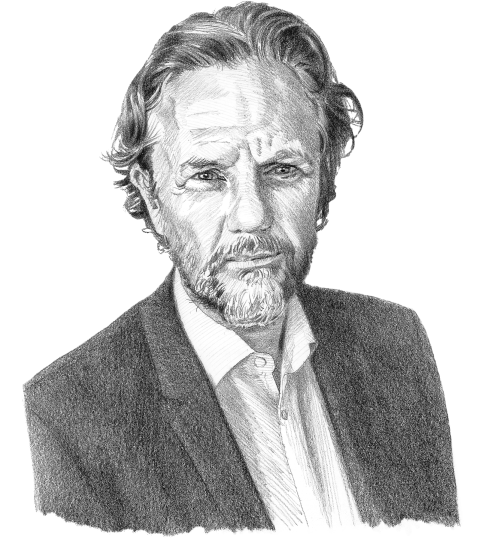Tunisia’s democratic decline
In the birthplace of the Arab Spring, civil liberties are eroding for a public increasingly frustrated by social and economic problems.

In a nutshell
- President Kais Saied has a tight grip on power
- The socioeconomic climate is deteriorating
- Concerns among Western powers are growing
Revolutionary hope has evaporated in Tunisia. Twelve years after the Arab Spring began with the overthrow of President Zine el Abidine Ben Ali, the Tunisian people have entered a state of resignation. Those who once defied a notorious secret police force and took to the streets chanting for freedom now appear complacent in the face of the country’s new strongman, President Kais Saied.
Even the most fundamental gains of 2011, such as the freedom of expression, have eroded. Two years ago, Mr. Saied dissolved the National Assembly, transforming it into a repository of executive power. The establishment of local councils was one of the achievements of the revolutionary era; they have now also been dissolved, following constitutional reform and legislative elections. Now, members of parliament can only act in their own names and no longer under the banner of a political group.
Demonstrations are taking place in Tunis and other major cities in response to these changes, but the dynamism of the past – the passion and fervor of protest that once gave Tunisians the capacity to express their anger – has disappeared. The population is disillusioned by a first decade of democratic experience in which they enjoyed the freedom of expression but found the country mired in antagonisms between the Islamists of Ennahda and socio-democratic political formations.
While the parliament engaged in incessant political jousting, the economy collapsed. The catastrophe is staggering: declining growth, an exodus of investors, inflation, unemployment and shortages of essential items (milk, meat and medicine). The World Bank highlights glaring disparities and utter disorganization: “In Tunisia, the wealthiest households receive three times more food and energy aid than the poorest.”
Tunisians did not anticipate such a collapse of the state apparatus. The Covid-19 crisis marked a turning point, as the Carthage Palace proved incapable of managing the public health emergency. Between delays in the vaccination campaign, chaotic quarantine management, and scuffles in front of vaccination centers among exhausted citizens waiting for treatment, something snapped. The Tunisian collective unconscious understood that the country could not continue like this.
From renunciation to anger
President Saied adeptly recognized the weariness of a people who harbor unspoken nostalgia for the economic stability of the Ben Ali regime. In the name of restoring order, in 2021 he seized control of the machinery of power. Methods thought to be obsolete have made a comeback, like arrests of high-ranking officials, diplomats, judges and lawyers. Media moguls are taken to court, while businessmen and politicians are accused of treason and terrorism.
One newly elected MP, Olfa Marouani, did not have time to sit in parliament before a court sentenced her to eight months in prison. A former finance minister was charged with “conspiracy against state security” after hosting opposition members at his home. In February, four ministers were dismissed within the span of a month, including Foreign Minister Othman Jerandi.
Read more from Pierre Boussel
The Arab world faces China’s ambitions
With political activity now perilous and offering little hope for results, Tunisians are focusing on essential needs. The poorest have no good alternatives, as exemplified by the man who self-immolated in the governorate of Nabeul – a testament to the desperation of a population that, just three years ago, served as a model for the Maghreb. Others, more fortunate, use their medical degrees to escape the regime and practice their profession in Europe.
To express themselves, Tunisians have turned to street demonstrations. They gather spontaneously and burn tires to protest against inflation. Roads are blocked to draw the government’s attention to unemployment, which affects 37.8 percent of young people aged 15 to 24. Tear gas has been fired in the suburbs of the capital, in the town of Ettadhamen, in Mornag, and in Douar Hicher. Everything becomes a catalyst for protest: waste management, access to healthcare, water shortages in the summer and marine pollution. Elevators in hospitals break down, resulting in tragedies like the death of a patient in the Jendouba hospital. While demonstrators demand a return to democracy, the prevailing concern remains the economic and social situation.
The regime agreed to negotiate with the powerful Tunisian General Labor Union (UGTT) to raise civil service wages in 2022. Since then, relations have deteriorated. Anis Kaabi, the secretary general of the union’s motorway section, was arrested and brought to court after organizing picketing at toll booths. The Irish head of the European Trade Union Confederation, Esther Lynch, was recently expelled from Tunisia while on an evaluation visit. Both trade unionism and politics have become highly risky activities in Kais Saied’s Tunisia.
The mystery of Carthage Palace
Nothing predestined Mr. Saied to become an authoritarian president. A professor of constitutional law at the University of Sousse, he had long embodied the image of a peaceful, pious and cultured Tunisian intellectual – an outsider who promised not a political program, but the application of moral values to set the country right.
President Saied has never wavered from his favorite themes: the fight against the enemies of the community (umma), whom the holy scriptures refer to as “hypocrites,” and the pursuit of speculators, because transactions based on financial interest are forbidden in Islam. As for elections, he does not hesitate to publish results, however weak they may be, as long as they can demonstrate that Tunisians “no longer trust this institution.” For him, democracy is an imported model that has no place in the country. While the West was alarmed by the disastrous turnout of just 11.4 percent in the last parliamentary elections, the Tunisian president was delighted that a vast majority of voters stayed away from the ballot box.
Mr. Saied portrays himself as a just man who punishes the unjust. He speaks in a lofty language of tribal populism, expressed without diplomatic restraint and risking unforeseen consequences. After describing African migrants crossing Tunisia to Europe as a “horde,” the World Bank suspended relations until further notice. The decision comes at a bad time for Tunis, with a loan of $1.9 billion from the International Monetary Fund remaining pending. The European Union is also hesitant about its aid programs. The international community continues to demand signals of openness, but Tunis remains obstinate, eager to denounce the interference of foreign powers.
International reaction
As the international community grows impatient and NGOs call for the release of political prisoners, the United States no longer hides its disappointment. The White House believed in Tunisia – $1.4 billion has been provided since the revolution, with an annual budget reserved for the armed forces ($112.1 million in 2022). The U.S. has now distanced itself. Ambassador Joey R. Hood recently confirmed a reduction in military aid to the country’s security forces, without specifying an amount.
Adding to the frustration, Tunisian citizens were arrested after having contact with members of the U.S. diplomatic corps in Tunis. The White House openly expressed its concern, giving Kais Saied a frosty reception at the U.S.-Africa summit in December. The Tunisian president had hoped for words of encouragement. Instead, he was admonished to return to minimum standards of democracy.

The Tunisian president remains unwilling to change tack, even if it means reshuffling the cards in his diplomatic game – which has so far been oriented toward the West. Mr. Saied wants to renew diplomatic relations with Bashar al-Assad’s Syria and already has excellent relations with Algeria, both Moscow allies. While he does not explicitly support powers like Russia, he stands firmly against the West. Yet his peculiar persona, solitary and elusive, does not resonate well in the Kremlin. Russian Foreign Minister Sergei Lavrov has twice postponed an official visit to Tunis, now indefinitely – Moscow, too, would like to know where Tunisia is heading.
Scenarios
In a more likely scenario, Tunisia reverts to its past: the authoritarian regime guarantees its people social peace and economic prosperity. The president tightens his grip on society by continuing to (discreetly) rely on the security forces. The West resigns itself to helping the country prevent collapse and discourages it from joining the Moscow-Tehran-Beijing diplomatic axis. Mr. Saied, 65, exploits the great-power geopolitics resulting from the war in Ukraine to stay in power.
In a second scenario, the deterioration of the social climate, observed since the beginning of the year, accelerates. The UGTT becomes one of the last organizations that dares to challenge the government. Repeated strikes paralyze the country. Wealthy Tunisians go into exile; others take to the streets to protest inflation and food shortages. China takes advantage of Tunisia’s bankruptcy to establish itself in the country, achieving a strategic extension of the Silk Road on the southern frontier of the EU.









